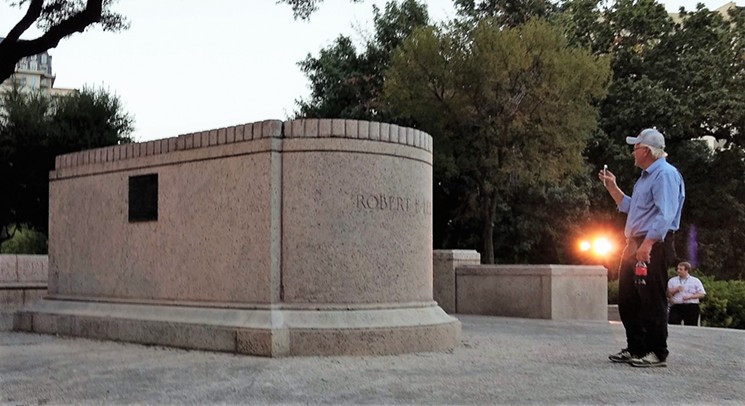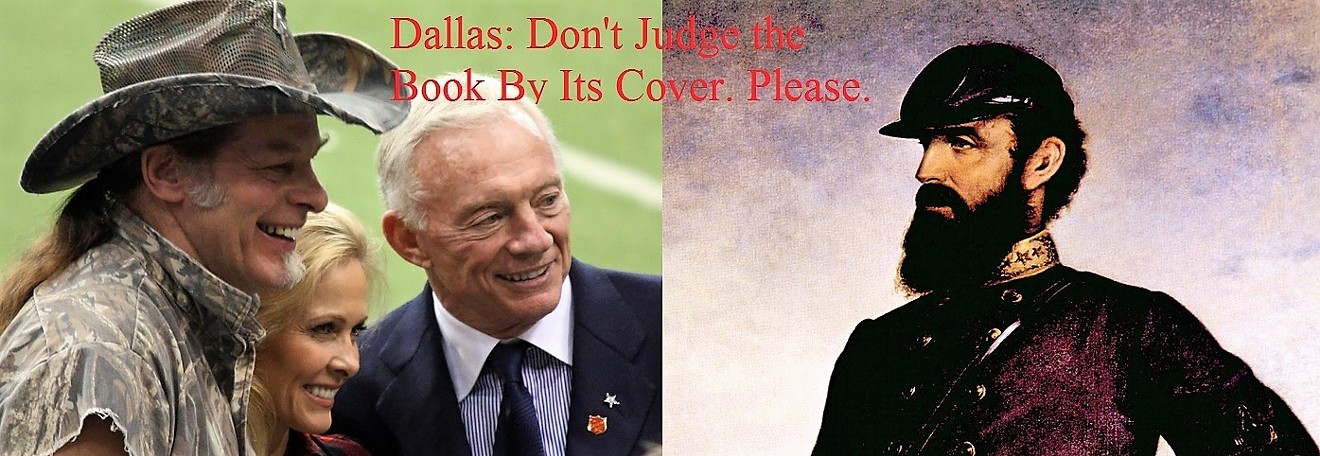I know, I know. We have to talk about the cover. In fact, let’s do that first. As far as the kind of city this is and what sort of place it might be for you to set up shop, we need to discuss what’s on the cover of the book called “Dallas.”
Jerry Jones. Right! He’s on the cover, big time. Dallas is the first and only major league football city where the owner of the team has the ability to tell his players they are not allowed to express themselves politically in public.
Not one of them is allowed to express his feelings on social issues by taking a knee during the playing of the national anthem before football games. Jones has said if one does, he won’t let the team play the game.
In Dallas, that’s kind of like being wide awake with your heart surgeon standing there with the bloody scalpel in his hand telling you he won’t sew you back up if you don’t swear allegiance to President Donald Trump. So, yes, that is definitely on the cover.
If you look really closely at the cover — I wish you wouldn’t, but I know you will — you will notice our recent contretemps over Confederate statues and school names. You may also notice, if you use a magnifying glass, that our African-American City Council members originally sided with the old white establishment in defending the continued presence of a very prominent statue of Confederate Gen. Robert E. Lee.
Only when wiser voices in the black community scolded them, explaining to them that the statue, erected in the 1930s, was a symbol of white supremacy, did the black council members switch armies and decide they were opposed to the statue and to white supremacy after all.
In other words, Dallas' black council members got themselves in sync with the 21st century eventually, but it took a while, and it required some serious ear boxing from the community. And sadly, in terms of what’s on the cover, we’re not actually done with the Civil War quite yet.
At a recent school board meeting, Dallas public school system trustee Joyce Foreman, who is African-American, sided with people who want to preserve the name Stonewall Jackson for an elementary school in East Dallas. Thomas Jonathan Stonewall Jackson was a Confederate general who, before the Civil War began, called the war a necessary measure to preserve African slavery, which he deemed to be ordained by God:
Jackson wrote: “If the North denies Virginia the rights guaranteed to us by the Constitution of our country, if the North should endeavor to subjugate us, and thus excite our slaves to servile insurrection in which our families will be murdered without quarter or mercy, it becomes us to wage such a war as will bring hostilities to a speedy close.”
I ran into Foreman on Monday and asked her why she wanted to keep a Dallas elementary school named for a defender of slavery. She said she never said that, and she challenged me to go back and listen to what she said. So I did.
At the recent school board meeting, Foreman indicated she was sympathetic with a faction of Stonewall parents who want to keep the famous enslaver’s name on the front of their schoolhouse forever, a position she later reiterated in a segment of “Inside Texas Politics” with Jason Whitely on WFAA-TV (Channel 8).
I do admit, on listening to her words again, that it’s very hard to make sense of what she says, except for the big thing: She’s against changing the name. She says she thinks renaming schools is a “diversion from the real problem,” which she says is something about “the culture.”
Seems like it would be a start.

Dallas knew what to do with Robert E. Lee. We'll do the same with Stonewall, if you give us time.
Jim Schutze
Except that it’s not. It’s named for Stonewall Jackson. So it’s hard to see how people could pull the wool over the eyes of history and claim the name means something else.
Ah, but what are we talking about anyway? What’s on the cover. And what’s on the cover is the one city where a rich white guy tells a bunch of professional athletes they can’t express their political opinions, and they obey him. It’s a city where the black council members have to be reminded why they are opposed to white supremacy. And it’s a city where a black school board member can’t figure out why children in the 21st century should not walk into a school every morning that is named, secretly or not, for a defender of one of the most egregious sins in the history of humankind.
That’s only the cover. Please look inside.
Stonewall Jackson is a public school with a history and reputation so strong, so immensely favorable, that the school has changed the entire residential real estate dynamic in its environs. Families downsize their houses in order to afford something in the Stonewall district. It’s that good.It’s named for Stonewall Jackson. So it’s hard to see how people could pull the wool over the eyes of history and claim the name means something else.
tweet this
The black elected representatives on the council and the school board are remnants of a day when Dallas was a brutally segregated outlier of the Old South, worse than the Old South in many ways because the civil rights movement that softened the South never really got here.
But lift your eyes and look at our first-ring, close-in suburbs. That part of the metropolitan area is a rich garden of diversity, where people of all ethnic stripes and national origins live in a harmony that looks a whole lot like Martin Luther King Jr.’s dream come true.
Slowly but surely, that more diverse and progressive world is pushing back into the city proper, eroding the archaic cultural fortresses that still separate people. Want to see some great evidence of that? Stonewall Jackson.
Foreman is right about that. There definitely is a Stonewall community. It is progressive, diverse and growing in strength. And, believe me, the smart people in that community, unlike Foreman, know that they need and deserve a new name, a name to project what the city is becoming rather than a name that only reflects a dark past.
Think about this. The cover of our book is a tease. You know it is. It can’t be true. Some rich yahoo football owner telling a bunch of professional adults when they can and cannot engage in free speech? Black elected officials who aren’t sure which side to take on white supremacy?
If you turn only a few pages, you will see that our City Council is loaded up with sophisticated young progressives, closer every election to a majority, who are full of ideas and itching to put them into motion. You will see that the city is full of young, whip-smart black and Hispanic leaders who can’t wait to put the old guard into the political equivalent of assisted living.
What that cover really means is that it’s all on the verge. Dallas is a city almost visibly vibrating with impacted potential. The fireworks are coming, and they will be stunning. At that point, if you don’t mind, we probably will put the fireworks on the cover.












